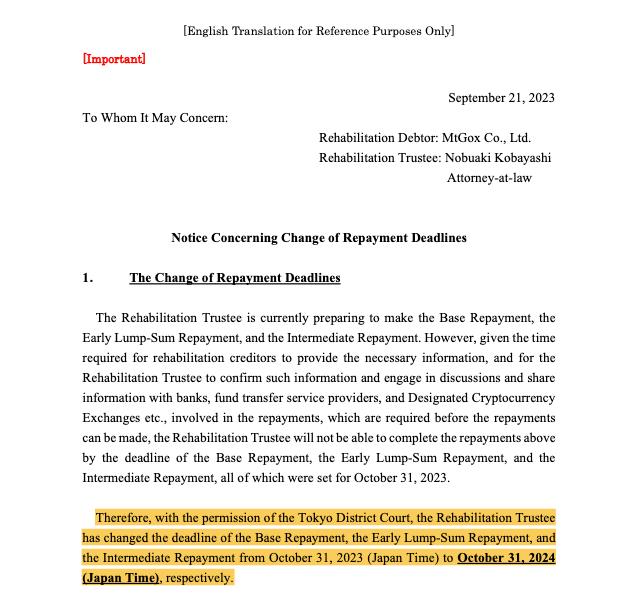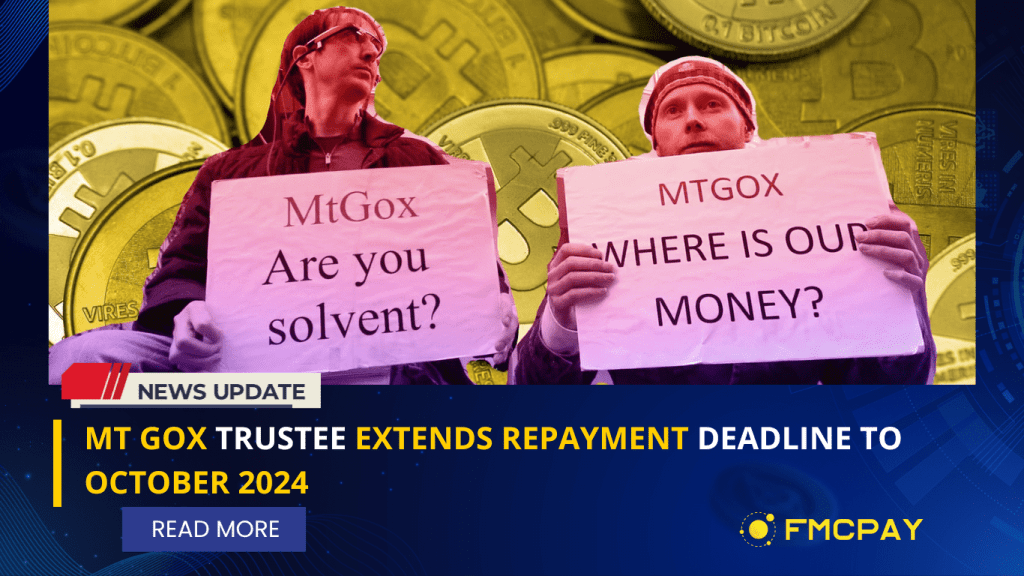The Mt Gox repayment deadline has been extended by one year, courtesy of Rehabilitation Trustee Nobuaki Kobayashi.
Latest Updating:
Nobuaki Kobayashi, the trustee of Mt Gox, has formally modified the repayment deadline for the exchange’s creditors. The previous deadline of October 31, 2023, has now been officially extended to October 31, 2024.
In a letter dated September 21, Kobayashi stated that, with the approval of the Tokyo District Court, he has extended the deadlines for the base repayment, early lump-sum repayment, and intermediate repayment.

Furthermore, Kobayashi clarified that for rehabilitation creditors who have provided the necessary information, repayments will commence sequentially as early as the end of this year. However, he cautioned that this schedule is subject to change depending on circumstances, and the specific timing of repayments to individual rehabilitation creditors has not been finalized.
At present, the Mt. Gox estate holds approximately 142,000 Bitcoin (BTC), valued at approximately $26,580 per BTC, 143,000 Bitcoin Cash (BCH), valued at around $208 per BCH, and 69 billion Japanese yen.
Check Out the Latest Prices, Charts, and Data of BHC/USDT
What was Mt Gox?
The company’s inception can be traced back to 2010 when it was founded by the American programmer Jed McCaleb. The following year, it changed hands and was acquired by the French developer Mark Karpelés.
Mt. Gox emerged as a prominent entity within the cryptocurrency sphere, reaching its zenith in 2013 when it managed a staggering 70% of all global Bitcoin transactions. Although this dominance marginally receded to 70% at the outset of 2014, the company remained robust and thriving.

However, Mt Gox’s fortune took a catastrophic turn when it fell victim to the largest Bitcoin breach on record. Hackers successfully infiltrated the platform and made off with a staggering 740,000 bitcoins from Mt Gox customers, along with an additional 100,000 from the company itself.
This amounted to approximately $460 million in value at that time. Subsequently, events spiraled out of control at an alarming pace, leading to the company’s declaration of bankruptcy by the end of February 2014.
How Did It Happen to Mt Gox?
Mt Gox’s prominent position in the cryptocurrency realm made it a prime target for hackers, leading to a series of security incidents throughout its years of operation. In 2011, hackers exploited stolen credentials to initiate Bitcoin transfers. That same year, vulnerabilities in network protocols resulted in the apparent loss of several thousand Bitcoins.
As the calendar approached February 2014, customer frustration mounted due to difficulties in withdrawing funds. Technical glitches further compounded the situation, leaving the company with uncertain transaction records, including doubts about whether Bitcoins had been correctly transferred to customers’ digital wallets.
The fatal blow to the exchange occurred in February 2014. Early that month, Mt Gox suspended all withdrawals, citing suspicious activity in its digital wallets. The company shockingly disclosed the loss of hundreds of thousands of Bitcoins, with varying reports suggesting a range from 650,000 to 850,000 vanished coins.
Although a portion of the missing cryptocurrency, approximately 200,000 Bitcoins, was eventually located, the loss had a profound destabilizing impact on the market. The estimated value of these Bitcoins amounted to hundreds of millions of dollars, plunging Mt Gox into insolvency. In response, the company filed for bankruptcy in the Tokyo District Court and received orders for liquidation in April 2014.
Subsequently, the assets of Mt Gox were placed in an estate that held more than 200,000 Bitcoins and Bitcoin Cash. In October 2019, the Mt Gox trustee, Nobuaki Kobayashi, extended the deadline for submitting claims to March 31, 2020. Speculation arose regarding Russian hackers’ involvement in the heist, with hopes that some of the stolen Bitcoins might eventually be recovered.
Additionally, CoinLab, a significant creditor in the Mt Gox case, continued its pursuit of a multibillion-dollar breach of contract lawsuit against the exchange.
The Future of Mt Gox
In November 2021, Mr. Kobayashi, the trustee overseeing Mt Gox, made a significant announcement following an agreement reached between Japanese courts and Mt Gox creditors regarding the Mt Gox rehabilitation plan. This plan outlines a structured registration and compensation process, divided into phases for different creditors. Approved rehabilitation creditors, identified by their creditor codes, were given the opportunity to register on the MT Gox Online Rehabilitation Claim Filing System.
Unfortunately, it’s important to note that the system no longer accepts new rehabilitation claims. The Tokyo District Court had referred the rehabilitation draft to a resolution back in February 2021, effectively sealing the process and preventing the initiation of any new claims.
The future of Mt Gox in the cryptocurrency world remains uncertain. However, what is certain is that a significant chapter in the history of cryptocurrency has now concluded with the resolution of the Mt Gox case.
What Happened to the Mt Gox Bitcoins?
Only about 200,000 were ever recovered. The rest are lost or removed from the network.
How Many Bitcoins Did Mt Gox Lose?
Reports range from 650,000 to 850,000, some of which belonged to the company and the rest to customers.
Mt. Gox was among the earliest cryptocurrency exchanges and once facilitated over 70% of all transactions within the blockchain ecosystem. Following a significant hack in 2011, the platform ultimately collapsed in 2014 due to alleged insolvency. This incident impacted around 24,000 creditors and resulted in the loss of 850,000 BTC.

